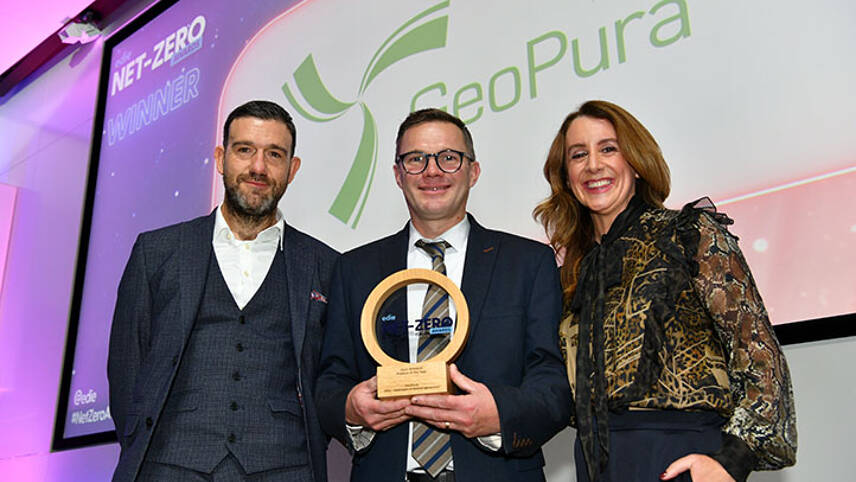This premium content is exclusive to edie Members.
To find out more about edie Membership, please click below.
If you are an existing member, login here

At a glance:
Who: GeoPura
What: Hydrogen-powered generators
When: First utilised in 2019
Where: Across the UK
Why: To provide reliable clean power to off-grid locations
The challenge
Demand for off-grid and back up power is rising, with some forecasts predicting a 50% market increase for diesel generators to $38bn over the next five years. With the UK being the largest diesel generator market in Europe, this market growth could threaten decarbonisation targets unless low-carbon alternatives can come to market.
The solution
The GeoPura hydrogen-powered generator (HPU) converts hydrogen to electrical power via a fuel cell system. The process is zero emission, the only by-product is pure water and unlike diesel generators, there are no nitrogen oxides or particulate emissions and very little noise pollution, improving local air quality.
How it works
A GeoPura HPU is built on industrial hydrogen fuel cells, and provides 250kW electrical output, 80kW thermal power and 216kWh battery storage. Packaged within a standard 20ft shipping container, a GeoPura HPU and a supply of hydrogen can be delivered to almost any site that requires off-grid, temporary, or back up power, providing easy access to zero-emissions electricity.
Whereas a typical 250kVA diesel generator would emit 960g of CO2 per kWh, as well as 932.5g of NOx/HC, and 327.5g of CO per hour of operation; the HPU emits zero pollutants. Additionally, multiple HPUs can be combined to create a 2MW system.
The design of the HPU means that backup generators are not required. It operates off-grid, with grid augmentation and backup power modes that provide flexible power to manage peak loads. It can also complement other sustainability initiatives such as being integrated with onsite electric vehicle (EV) charging.
The HPU can also be configured to deliver combined heat and power (CHP) at no extra costs, providing hot water and heating for onsite welfare units, sanitary facilities, or other requirements.
Currently, GeoPura is focusing on at-need sectors such as construction and infrastructure, transport film and TV production and temporary power and events. The company does not that the HPU can be used anywhere that the grid cannot support.
The results
The first HPU was installed and exhibited at the Goodwood Festival of Speed in 2019 and has since been utilised in live broadcasts such BBC Winterwatch, Springwatch and Autumnwatch. It has provided scalable EV charging for the Polestar 1 European Press Drive and is used in construction projects such as the National Grid’s Viking Link interconnector project, HS2 Crossover Box, Balfour Beatty A36 works amongst others.
Existing trials have seen 94 tonnes of CO2 saved during a three- month outage at Uniper, around 51 tonnes saved on a HS2 site deployment and 164 tonnes at The National Highway’s A63 Castle Street site.
Over the life of an HPU, GeoPura expects to avoid emissions of 1,800 tonnes of CO2 when compared to a diesel generator.
The organisation
GeoPura was founded in 2019, with a mission statement to decarbonise the global economy with clean, green hydrogen power, source enough clean energy to move away from fossil fuels and navigate the logistical issues of getting this energy to where it is needed.
The HPU is built on more than 10 years of research and development.
The judges said:
“This innovation clearly demonstrates a viable alternative to diesel generators, a market that if current projections are correct is only going to get bigger if left unchecked. GeoPura HPU is our winner because it clearly spelled out the environmental challenge the product is hoping to solve for as well as well as sharing some clearly defined applications for the product that go beyond construction to a wider range of sectors which could benefit, which means there is exciting potential for this to scale.
“The current use cases are good as well as a strong outline of the potential CO2 emissions savings when compared to a diesel alternative, which makes this a no brainer. As the entry rightly says: A truly innovative solution, our HPUs provide reliable, clean energy and an opportunity for industry to meet environmental targets, operate successfully in zero emission zones and support the global race for net-zero.”
© Faversham House Ltd 2024 edie news articles may be copied or forwarded for individual use only. No other reproduction or distribution is permitted without prior written consent.

